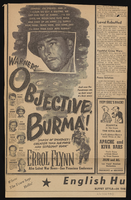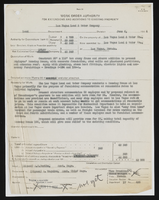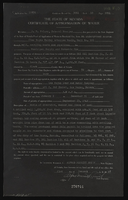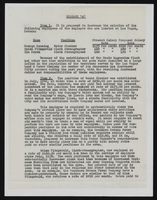Search the Special Collections and Archives Portal
Search Results
Barbara Atkinson oral history interview
Identifier
Abstract
Oral history interview with Barbara Atkinson conducted by Claytee D. White on August 5, 2019 for the UNLV School of Medicine Oral History Project. Atkinson begins by talking about her family and early life. She recounts her experience in medical school, women in medicine, and sexism and discrimination in medical schools. She brings up her mentors and what she had learned from each of them. She explains her pathology specialization, her research, and publications she has written. After, Atkinson talks about her occupation history and her retirement. She mentions how some attitudes about women and sexism have changed and some have stayed the same within the medical profession. She was hired by Don Snyder, John White, and Carl Reiber in 2014 to make a medical school at the University of Nevada, Las Vegas. She goes in depth about the process, plans, obstacles, and the general medical training the students go through. Atkinson then talks about the history of Nevada's medical schools in Reno, Nevada and Las Vegas, Nevada. Lastly, she talks about her opinions on health care, her outlook on future generations, future plans for UNLV School of Medicine, and community of color interactions.
Archival Collection
Jill Roberts oral history interview
Identifier
Abstract
Oral history interview with Jill Roberts conducted by Barbara Tabach and Claytee D. White on March 20, 2018 for the Remembering 1 October Oral History Project. In this interview, Jill Roberts discusses her position as the CEO of the Trauma Intervention Program (TIP) of Southern Nevada. She also delves into her part-time work at the coroner's office as a death investigator and discusses her personal background in Las Vegas, Nevada after she moved to the city in 1977. She describes the role TIP had during the aftermath of the October 1, 2017 mass shooting, where well-trained volunteers were dispatched to hotels, hospitals, and anywhere else the survivors reached in order to provide emotional and practical support. Throughout the interview, Roberts emphasizes that the assistance provided to those in a traumatic event depends on each individual's needs. She shares a few examples of what the TIP volunteers had helped with after the shooting, including listening to the survivors' stories as well as providing information on the situation, helping separated loved ones find each other, arranging travel for some survivors to go back to their homes, and procuring clothes and shoes for those who needed them. Roberts also discusses the gratitude TIP had received after the shooting, including the thank you cards sent by Sandy Hook High School.
Archival Collection
Audio clip from interview with Henry and Anita Schuster by Claytee White, March 1, 2011
Date
Archival Collection
Description
Part of an interview with Henry and Anita Schuster on March-April 2011. In this clip, the Schuster's discuss childhood, family, and life during the rise of Nazi power.
Sound
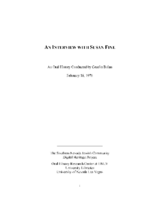
Transcript of interview with Susan Fine by Cecillia Boland, February 18, 1976
Date
Archival Collection
Description
Interview with Susan Greenspun Fine by Cecillia Boland on February 18, 1976. In this interview, Fine talks about growing up in Las Vegas and her schooling. The interview is geared towards the growth of Las Vegas from her childhood to her adulthood, including roads, air travel and medical facilities. She is the daughter of Hank and Barbara Greenspun, owners of the Las Vegas Sun newspaper, and discusses being involved in all the happenings around town because of that.
Text
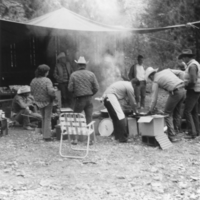
El Riata trail ride: photographic print
Date
Archival Collection
Description
From the Nye County, Nevada Photograph Collection (PH-00221) -- Series IV. Pahrump, Nevada -- Subseries IV.B. Ruud Family. El Riata was a horse training and riding club for the children of Pahrump, Nevada. Once each year the children went on a long ride, with a barbeque and overnight stay. Bob Ruud was chef; he would drive his cattle truck up, attach a tarp, cook, and let the smaller children sleep inside the truck.
Image

